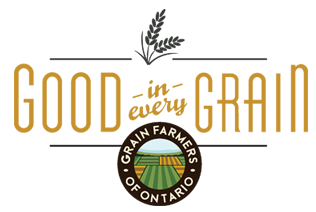Five food myths debunked by science
This special guest blog post is by Yvette d’Entremont — better known as SciBabe. Her popular website debunks pseudoscience with a humorous bent. Food myths are a common theme she deals with on the site. You can catch Yvette speak in London, ON this month, at Grain Farmers of Ontario’s March Classic conference.
Five food myths debunked by science
You’ve seen them everywhere: scary rumors that the food is out to get you! Sugar is toxic, cheese is addictive, and GMOs… well, they’re up to something right?
Nope, science says the food is safe. Here are five food myths debunked by science.
Food is addictive.
There have been a lot of click-baity headlines saying that different foods like sugar or even cheese are as addictive as drugs. But this hasn’t been proven. The methodologies in these studies don’t prove addictions; they prove that people like these substances, they’re tasty, and so people keep eating them. They may continue eating them, but they haven’t proven withdrawal symptoms, brain chemistry alteration, or any of the things that actually go with a drug addiction.
GMOs are dangerous.
This has been repeated so often that it’s become commonplace to believe the lie. The truth? GMOs are fine. One of the reasons that this rumor has so readily sprouted up is that foods that contain products derived from GMOs are often highly caloric and heavily processed. However, the process by which we genetically modify a crop has not been shown to cause harm to the crop, the environment, the animals who eat it as feed, or humans, either short or long term. There is suspicion about the pesticides used with GMOs, and in general genetically modified crops reduce the use of pesticides. Round Up is the most often cited example, and it is less toxic than table salt. I’m not saying you can live solely on GMOs (as they only represent a few crops), but like so many things, GMOs can be a healthy part of your diet.
Some foods or ingredients in foods are “toxic” for everyone.
Toxicity is a tricky one because some things that are currently on the market can be bad for you, depending on your health, your age, or any existing conditions. Nobody should consume raw milk, honey isn’t appropriate for children under the age of 1, and if you have celiac disease, Crohns, allergies, or a handful of other ailments, certain foods are off-limits. But given the spate of rumors of “toxic” sugar, gluten, and even bacon, can an otherwise healthy adult eat these in moderation without worry? Yes. There are no foods or additives currently on the market proven to be toxic in the amount that a healthy adult would–or should–eat them in a normal day or lifetime. Foods, and especially additives are heavily tested before hitting market, and the industry is in the business of re-evaluating if there is any reason for concern.
Artificial sweeteners are dangerous and cause health problems.
This one has come in and out of pop culture for a long time. The original study that caused this to pop into public consciousness said that saccharin- otherwise known as Sweet N Low- caused cancer in lab rats. However, the dose makes the poison, and the rats would have had to consume the equivalent thousands upon thousands of saccharin sweetened beverages. To say that all artificial sweeteners cause the same health effects misunderstands the chemistry of these substances; they’re chemically dissimilar substances derived from different sources with one thing in common; they taste sweet. They’ve all been tested, especially aspartame, more than most other food additives, and are continually shown to be safe for a vast majority of people.
There is one perfect diet.
There is no one perfect diet for all people. We keep trying to find THE ONE diet book that will solve all our weight problems, give us glowing skin, thicker hair, give us a raise, and make all our sex organs even sexier with the secret to life, the universe, and everything.
Guess what? It’s not going to happen. Your diet is personal to your metabolic rate, your activity level, any health conditions you have, what you prefer to eat (and yes, what you enjoy really does matter), and what fits your lifestyle. You can’t recommend someone eat all meals that take three hours to cook if they have a demanding job with long hours, and you can’t tell someone to live on low calorie salads if they’re an endurance athlete. Different people have different needs from food. The basic rules? Get your fruits and vegetables (they can be conventional or organic, fresh or frozen), and get enough protein and carbohydrate to fuel muscle growth and your activity level. Talk to your doctor and a registered dietitian for more information.
There are a lot more food myths out here, but these are circulating in pop culture lately. We’re finding more and more about diet and nutrition information all the time, and though it’s great to read up on them, a lot of times the headlines are misleading from the original article. Read carefully, check into long term studies, and check out both the headline and the scientific journal from which the headline got their information. The best place to find accurate health information on food is still your doctor and a registered dietitian.
